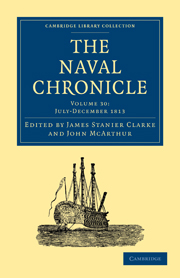 The Naval Chronicle
The Naval Chronicle Book contents
- Frontmatter
- PLATES IN VOLUME XXX: From Original Designs
- PREFACE TO THE THIRTIETH VOLUME
- BIOGRAPHICAL MEMOIR OF THE HON. CAPTAIN COURTENAY BOYLE, R.N. COMMISSIONER OF THE TRANSPORT BOARD
- BIOGRAPHICAL MEMOIR OF CAPTAIN JAMES MANDERSON, R.N.
- BIOGRAPHICAL MEMOIR OF THE LATE WILLIAM TRUSCOTT, ESQ. BEAR-ADMIRAL OF THE WHITE
- ADDITIONAL BIOGRAPHICAL MEMOIR, OF ADMIRAL SIR ERASMUS GOWER, GIVEN IN THE FOURTH VOLUME OF THE NAVAL CHRONICLE, PAGE 257
- BIOGRAPHICAL MEMOIR OF THE LATE CAPTAIN JAMES NEWMAN NEWMAN
- BIOGRAPHICAL MEMOIR OF LIEUT. WILLIAM ELLETSON KING, R.N.
- INDEX
BIOGRAPHICAL MEMOIR OF CAPTAIN JAMES MANDERSON, R.N.
Published online by Cambridge University Press: 10 January 2011
- Frontmatter
- PLATES IN VOLUME XXX: From Original Designs
- PREFACE TO THE THIRTIETH VOLUME
- BIOGRAPHICAL MEMOIR OF THE HON. CAPTAIN COURTENAY BOYLE, R.N. COMMISSIONER OF THE TRANSPORT BOARD
- BIOGRAPHICAL MEMOIR OF CAPTAIN JAMES MANDERSON, R.N.
- BIOGRAPHICAL MEMOIR OF THE LATE WILLIAM TRUSCOTT, ESQ. BEAR-ADMIRAL OF THE WHITE
- ADDITIONAL BIOGRAPHICAL MEMOIR, OF ADMIRAL SIR ERASMUS GOWER, GIVEN IN THE FOURTH VOLUME OF THE NAVAL CHRONICLE, PAGE 257
- BIOGRAPHICAL MEMOIR OF THE LATE CAPTAIN JAMES NEWMAN NEWMAN
- BIOGRAPHICAL MEMOIR OF LIEUT. WILLIAM ELLETSON KING, R.N.
- INDEX
Summary
“Our Country's welfare is our first concern,
And who promotes that best—best proves his duty.”
——Havabb.IF opportunities have not been afforded to this gallant officer (as they have not, to thousands of others) for distinguishing himself in a peculiar light as a naval hero, our readers will not fail to discover, in the several plans which he has conceived and suggested, with a view of serving his country, either in the way of defence to itself, or of destruction to its foes, that the amor patriœ is a prevailing principle in his mind.
The gentleman who is the subject of our present notice is a native of Scotland, and was born in the vicinity of Dunbar, in the shire of East Lothian. His father, William Manderson, was a respectable farmer of that neighbourhood, remarkable for his piety, his agricultural knowledge, extensive reading, and retentive memory; and who suffered for his attachment to the House of Brunswick, in the Rebellion of 1745, having several of his horses taken away by the rebels. Being acquainted with some of the officers, he ventured into their army to claim them; and being detained by the chiefs while inquiry was making, he had the courage and loyalty to refuse drinking the Pretender's health, although strongly urged thereto by some very particular acquaintance: his errand, however, was not successful. He was twice married; having taken for his second wife Margaret Denham, descended of a respectable family in the same line of business as Mr. Manderson.
- Type
- Chapter
- Information
- The Naval ChronicleContaining a General and Biographical History of the Royal Navy of the United Kingdom with a Variety of Original Papers on Nautical Subjects, pp. 89 - 176Publisher: Cambridge University PressPrint publication year: 2010First published in: 1813


